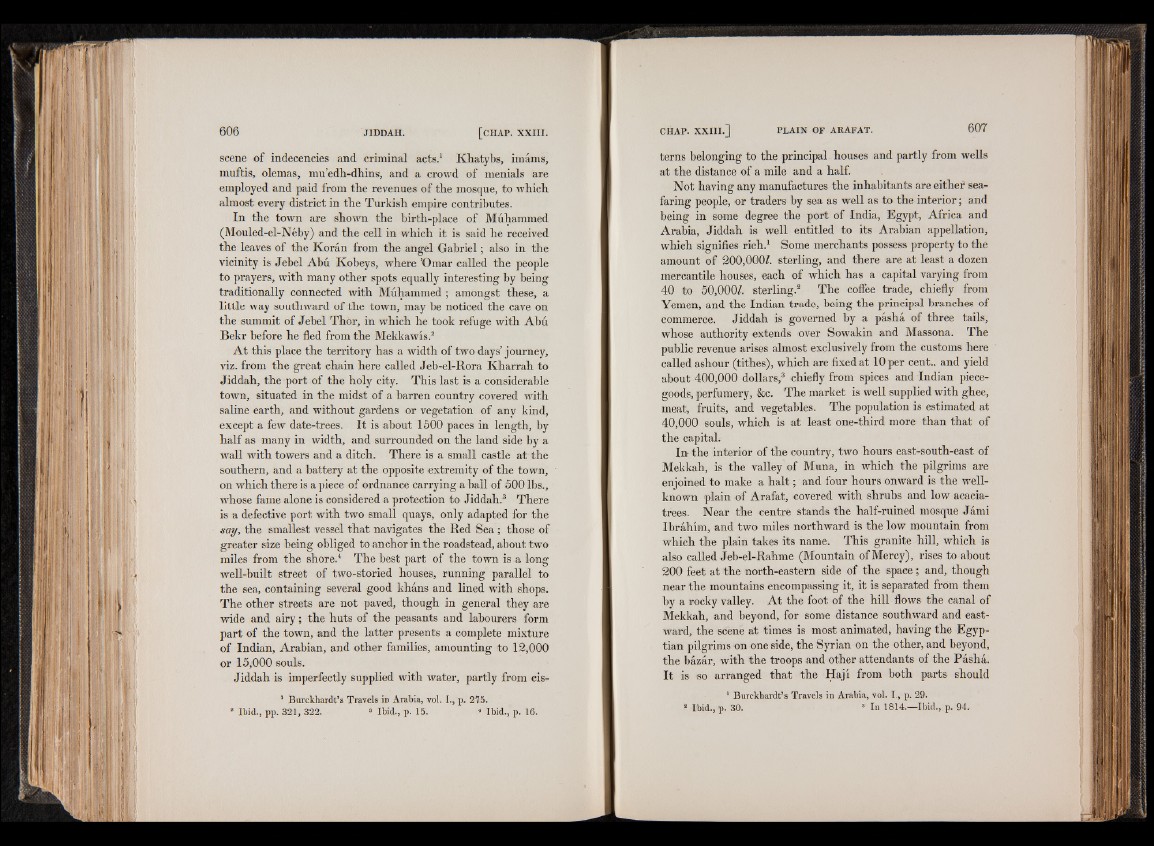
scene of indecencies and criminal acts.1 Khatybs, imams,
muftis, olemas, mu’edh-dliins, and a crowd of menials are
employed and paid from the revenues of the mosque, to which
almost every district in the Turkish empire contributes.
In the town are shown the birth-place of Muhammed
(Mouled-el-Neby) and the cell in which it is said he received
the leaves of the Koran from the angel Gabriel; also in the
vicinity is Jebel Abu Kobeys, where ’Omar called the people
to prayers, with many other spots equally interesting by being
traditionally connected with Muhammed; amongst these, a
little way southward of the town, may be noticed the cave on
the summit of Jebel Thor, in which he took refuge with Abu
Bekr before he fled from the Mekkawis.2
At this place the territory has a width of two days’ journey,
viz. from the great chain here called Jeb-el-Rora Kharrah to
Jiddah, the port of the holy city. This last is a considerable
town, situated in the midst of a barren country covered with
saline earth, and without gardens or vegetation of any kind,
except a few date-trees. It is about 1500 paces in length, by
half as many in width, and surrounded on the land side by a
wall with towers and a ditch. There is a small castle at the
southern, and a battery at the opposite extremity of the town,
on which there is a piece of ordnance carrying a ball of 500 lbs.,
whose fame alone is considered a protection to Jiddah.3 There
is a defective port with two small quays, only adapted for the
say, the smallest vessel that navigates the Red Sea ; those of
greater size being obliged to anchor in the roadstead, about two
miles from the shore.4 The best part of the town is a long
well-built street of two-storied houses, running parallel to
the sea, containing several good khans and lined with shops.
The other streets are not paved, though in general they are
wide and airy; the huts of the peasants and labourers form
part of the town, and the latter presents a complete mixture
of Indian, Arabian, and other families, amounting to 12,000
or 15,000 souls.
Jiddah is imperfectly supplied with water, partly from cisterns
belonging to the principal houses and partly from wells
at the distance of a mile and a half.
Not having any manufactures the inhabitants are either seafaring
people, or traders by sea as well as to the interior; and
being in some degree the port of India, Egypt, Africa and
Arabia, Jiddah is well entitled to its Arabian appellation,
which signifies rich.1 Some merchants possess property to the
amount of 200,000/. sterling, and there are at least a dozen
mercantile houses, each of which has a capital varying from
40 to 50,000/. sterling.2 The coffee trade, chiefly from
Yemen, and the Indian trade, being the principal branches of
commerce. Jiddah is governed by a pasha of three tails,
whose authority extends over Sowakin and Massona. The
public revenue arises almost exclusively from the customs here
called ashour (tithes), which are fixed at 10 per cent., and yield
about 400,000 dollars,3 chiefly from spices and Indian piece-
goods, perfumery, &c. The market is well supplied with ghee,
meat, fruits, and vegetables. The population is estimated at
40,000 souls, which is at least one-third more than that of
the capital.
Inr the interior of the country, two hours east-south-east of
Mekkah, is the valley of Muna, in which the pilgrims are
enjoined to make a halt; and four hours onward is the well-
known plain of Arafat, covered with shrubs and low acacia-
trees. Near the centre stands the half-ruined mosque Jami
Ibrahim, and two miles northward is the low mountain from
which the plain takes its name. This granite hill, which is
also called Jeb-el-Rahme (Mountain of Mercy), rises to about
200 feet at the north-eastern side of the space; and, though
near the mountains encompassing it, it is separated from them
by a rocky valley. At the foot of the hill flows the canal of
Mekkah, and beyond, for some distance southward and eastward,
the scene at times is most animated, having the Egyptian
pilgrims on one side, the Syrian on the other, and beyond,
the bazar, with the troops and other attendants of the Pasha.
It is so arranged that the Haji from both parts should